Guǎngdōng 广东- Guǎngxī 广西
Saturday, January 14, 2012
- Silkroad
Already after one day I had my equipment and Kurd (my bike) ready again. On Thursday morning, I got up at 8:00 clock and wanted to drive off after breakfast. However, it was raining outside. Easy, I thought. I lie down for two hours and then keep watching. The plan was good but Peter was not on my side that day.
Meteoblue meteoblue.com/den reported continued rainfall throughout southern China, including North Vietnam, by Saturday. As an individual traveler you have to be flexible. So I prolonged by one day and went with Niat and Rainer, two German roommates, on city tour. At the drawing monument, we decided to escape to the rain before going to a café. We found a small eatery that makes the biggest cappuccino I've ever had. In the beer glass! He tasted amazingly good.
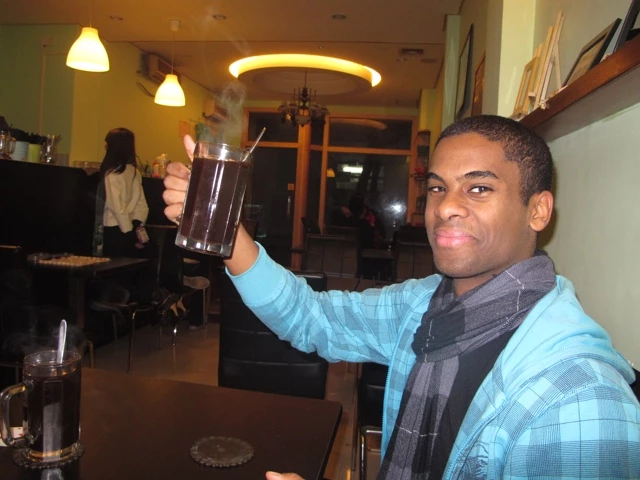
We played cards until the evening and ran home in the dark.
On Friday it was still raining like a bucket. Once again, my onward journey shifted by one day. In the evening, Rainer and Niat invited me to dinner with some friends from them who are doing their voluntary social year (FSJ) in Guangzhou. With seven people in total, this was a huge banquet, as usual in China. That's why I love the Chinese so much now. If eaten, then neat!
Saturday was really weather forecast correctly. I started at about eleven o'clock. Luckily I had already reconnoitred the way from the city the day before and found the exit relatively easy. There was a lot of traffic on the bike paths. Although my mother had brought me many spare parts and luggage to Hong Kong and my Kurd was heavily laden, I felt rather small next to the other road users.

Just a few miles out of town, in Foshan, I met Anson. He studies agronomy in Guangzhou at the Technical University, has bought a new bike and is now riding his bike home to his parents for the first time for the Chinese New Year.

He knew a lot about the area and steered me perfectly to the G324. The national road leads from Guangzhou via Nanning to Kunming. After four hours Anson said goodbye to me and took the turnoff to his parents' village.
Shortly before Zhaoqing I was looking for a place for the night. Because of the strong population that was no easy task. A few street workers finally showed me a large parking lot where I could set up my tent. The place is currently used to dry reeds. Next to one of those piles and under the palm trees, I set up my tent. That such a strange, white cyclist in the parking lot had apparently spread around the village.
Soon I was surrounded by a bunch of kids who were interested in watching me cook. Especially the loud Primus Kocher fascinated her. My mother brought me pesto and grated cheese from Switzerland. The children had never seen anything like it. A boy suddenly asked me if there was no vegetable left? I tried to explain to him how a pesto is made. The kids did not understand that. At the end, I pointed to Italy on the world map and said "Italy. Food very special ". Everyone started to laugh and let me eat my pesto in peace. Thank you mum for this culinary high!



The lively and rebellious Guangdong is one of China's richest provinces with the strongest economic development. Due to the mountainous topography, it was isolated from the rest of China for centuries, forcing the cantons to rely on their own pragmatism and innovative power to survive.
In former times, disgraced officials from the north were exiled here. Economically, Guangdong was on the sidelines until Deng Xiaoping's "open door policy" allowed the province to develop. With the establishment of the three special economic zones and the establishment of trade relations with Hong Kong, the economy developed at rocket-like speed, which has remained so to this day. Numerous smoking factories are scattering the one subtropical landscape. The future of China shows itself here unvarnished, with all the disadvantages.
I got acquainted with the mountains the very next day. Through Guangdong
The Tropic of Cancer is spreading. A tropic is one of the two parallel latitudes in 23 ° 26'16 "north and south latitudes, which represent boundary marks for the sun orbit. The tropics run 2600 km north and south of the equator. Between the northern and southern tropics are the tropics. The whole flora and fauna seem to me extremely exotic. With the many limestone cliffs, palms, orchids and strange animals I realized for the first time that I slowly came to a new area. Due to the long train journey across China, I did not really notice this change.
Also on this day I experienced a happy surprise. At a bus stop I took a short break. Siaozhin suddenly flitted past me. When he saw me he stepped on the brakes and joined me with his bike. He works as an engineer in Guangzhou and now also drives to his family to spend the holidays with them. He was a lot faster on the way and especially on the gradients I had a lot of trouble with my steel steed to connect.
In a small village Siaozhin invited me to dinner in a restaurant. He and the staff really enjoyed my story. I told about my trip and had to take a picture with everyone at the end. The Chinese always seem a bit closed to me at first. As soon as you try to talk to them, they are enormously interested and have a lot of fun, if you can speak a few words of Mandarin.

I could not thank my host too often. An hour later, I explained to him, in the middle of a mountain stage, that it's time for me to finish today. Not here! That's too dangerous. Did he mean. He ordered me to wait two curves and a few meters up the hill, drove into a tangerine plantation, returned a short time later with a sack of tangerines, and said I could spend the night here in the plantation. What more do you want?
He wanted to be in Luoding before dark because his parents were waiting for him there. After setting up my tent, the workers came by to make sure that I did not miss anything. Amazingly many women were among them. And everywhere else you see women who work in agriculture, on the building, in the forest and even in the quarry exactly like the men. That's what I call emancipation! The night in the tangerine plantation was one of the best in a long time. Sunlight is available here exactly from seven o'clock in the morning to seven o'clock in the evening. This makes the nights in the tent enormously long. My sleep mango from Hong Kong was soon cured.
The next day brought many slopes, but very beautiful landscapes and after Luoding went to a new province, to Guangxi. The campsite search was particularly tiring on this day. Only shortly before the dark, I found a reasonably quiet place in a quarry. The whole tent was soaking wet the next morning. When getting up, I also noticed why. Outside there was a stick-proof fog. There was a mystical mood in the street. You did not see nearly ten meters. The traffic rolled very slowly forward.
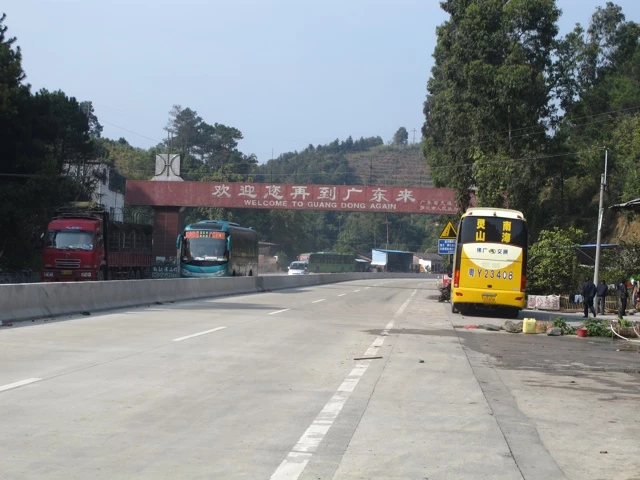
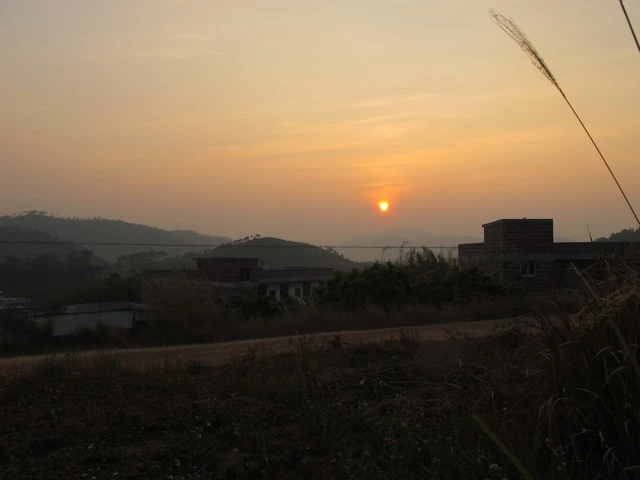

Guangxi means "continue, boundless west". For centuries, seclusion and difficult topography caused poverty here, which is still a problem outside major cities today. With an area of 236,000 square kilometers, Guangxi is the country's ninth-largest province, with a population of nearly 46 million.
Nearly 75% of Guangxi's population are not Han. Today, the Zhuang are China's largest ethnic minority, with more than 15 million living in Guangxi. The province is often referred to as the Guangxi Zhuang Autonomous Region and is home to a small number of people from the peoples of Dong, Maonan, Mulao, Jing (Vietnamese Gin) and Yi.
The next two days we went through predominantly agricultural area. At each corner lurks again a new surprise. Curious vehicles, funny farm animals and a huge chaos with a lot of noise, dust and Hubkonzert accompanied me. In the evening I have to collect the impressions once. In Iran, Central Asia and the Taklamakan desert, the landscape was characterized by stone and sand. The big colors and the many people are a big contrast to that.
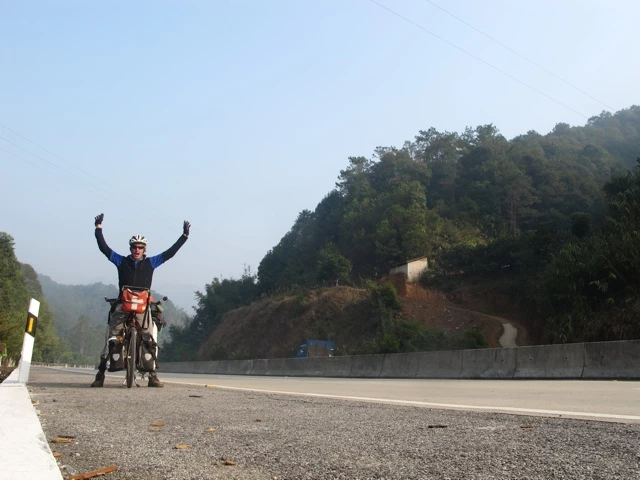
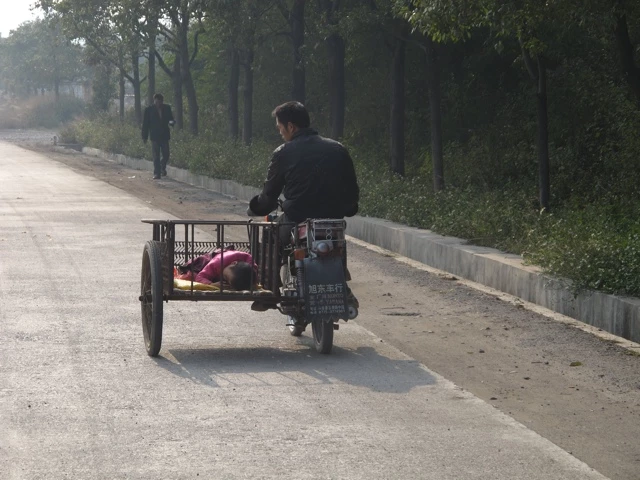
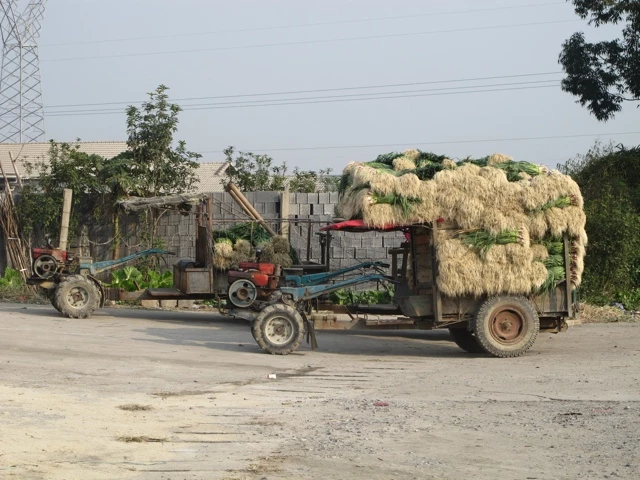

Unfortunately, clearcutting is also practiced here in the big still. As a former forest warden and arborist, this sight hurt me a lot. Sustainable forest management seems to be a huge foreign word here. Even otherwise, the waste is simply thrown away everywhere. The rivers and landscapes are partially dotted with garbage. Partly one notices the air pollution already at the inhalation. In terms of environmental protection, China still has a lot to catch up on. You do not have to be an expert to remember that.
In the cities it is not always easy to find the way. In Guigang, I asked a woman on the electric scooter for directions. She first tried to explain the way to me in English and at some point told me to follow her. She steered me through small streets and markets and at a brisk pace. Her son in the back seat obviously enjoyed this ride. In the end, I actually stood at the other end of the city. The woman even apologized for her English and said "I'm sorry, my English very poor".
Meanwhile, I have developed a new favorite food for cooking. Pasta with chilli oil, onion, garlic and eggs. In large quantities, this is a wonderful calorie bomb with propellant effect. Just the thing for a velonomy.
The traffic on the streets is partly murderous. Traffic rules are deliberately disregarded and every overtaking maneuver requires honking. I saw some heavy traffic accidents during those six days and often had to think about Alex fernziele.info. Incidentally, Bettina has decided to continue driving and is currently in Thailand. I admire this woman.
For the constant Hupkonzert on the street I have meanwhile made two categories. There are the idiots and the idiots. The idiots honk before the overtaking maneuver and try to keep their distance. The full idiots only honk when they pass by very close to one. In statistics, five idiots are usually followed by a complete idiot. That's my way of dealing with Chinese traffic. About 150 kilometers from Nanning, I set up my tent in the woods and started cooking.
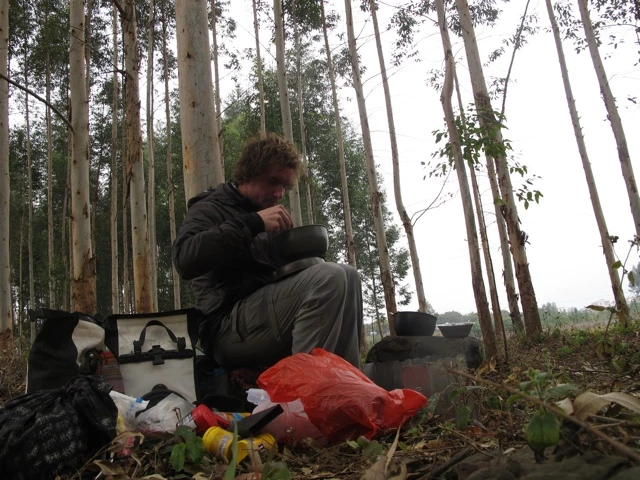
Just when I was done it started to rain. It rained all night. In the morning I made a decision: to Ninnang it had to be about 140-150 kilometers. With a lot of muscle, this would have to be done in one day. At some point you start to sweat under the rain gear and gets wet inside and out. What do you need for cycling at all rain clothes? It went through numerous villages where currently straight sugar cane harvested. Huge snakes of tractors with their overloaded cars line the street. It reminded me a little of the sugar beet harvest from the village of my childhood in Otelfingen.
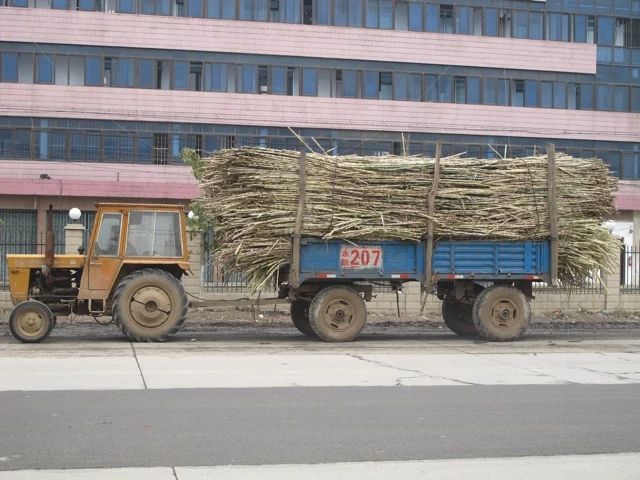

After more than nine hours in the saddle, I actually stood in Nanning at dusk. Since I have no speedometer, I do not know how many kilometers I drove that day. There were certainly not a few. The Lotusland Hostel was found by many questions soon. At check-in I was able to order my Vietnam Visa. For guests of the hostel they do the service for the same price as the embassy and you can comfortably wait in the room until the visa is in the passport. A great idea!
So on Friday I was able to do all the other things that happen on rest days on bike trips. Washing clothes, drying things, sorting out and answering mails. My bike pants have ripped up the back again. Either my cornea has grown on the buttocks or my pants have shrunk. After much questions and some funny experiences, I actually found a seamstress who sewed my pants and the Icebreaker sweater for 5 yuan (80 cents). At the end she said only very friendly and proud: "Welcome to Nanning".
My roommates looked pretty stupid out of the laundry when I hung up the many wet things in the room. Normally, a leash is available for drying on the roof. As Meteoblue reports heavy rain for the next three days, the hostel allowed me to hang things up in the room. In the evening, the Vietnam Visa was actually at the front desk. So I still have two rainy days in Nanning and then it goes after almost 4 months in China in a new country. I'm looking forward to seeing the Nomadbikefamily fr.nomadbikefamily.org in Hanoi.
